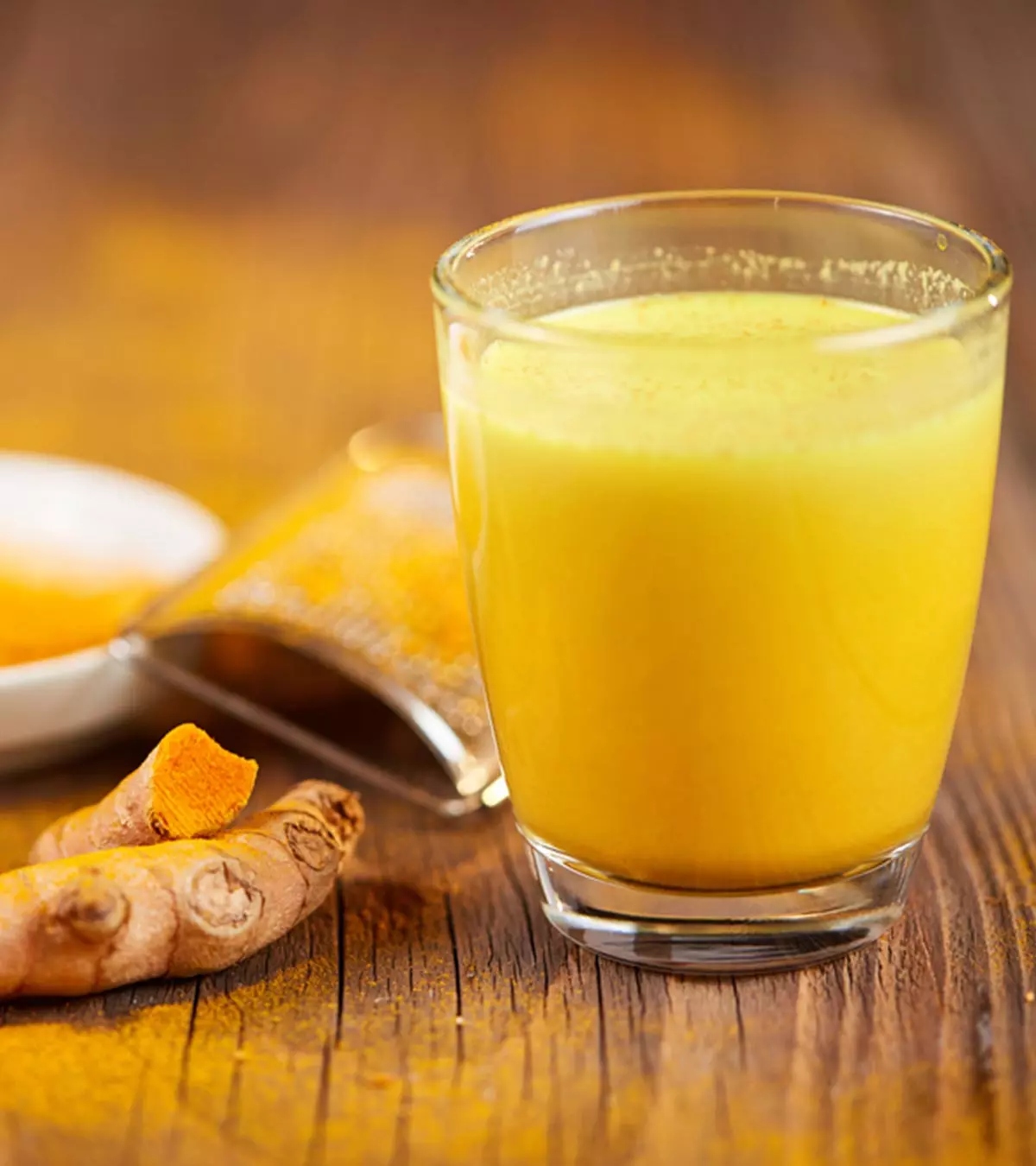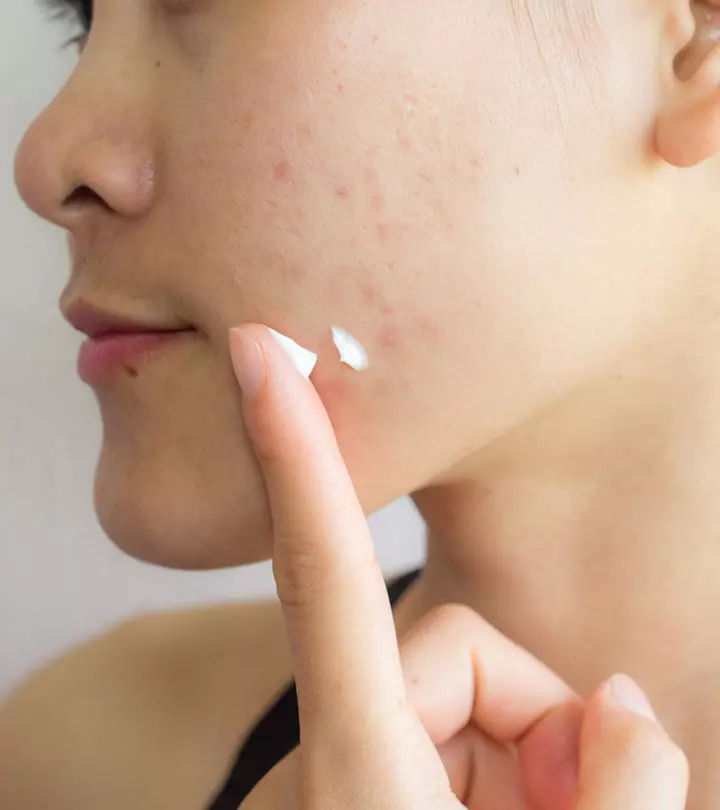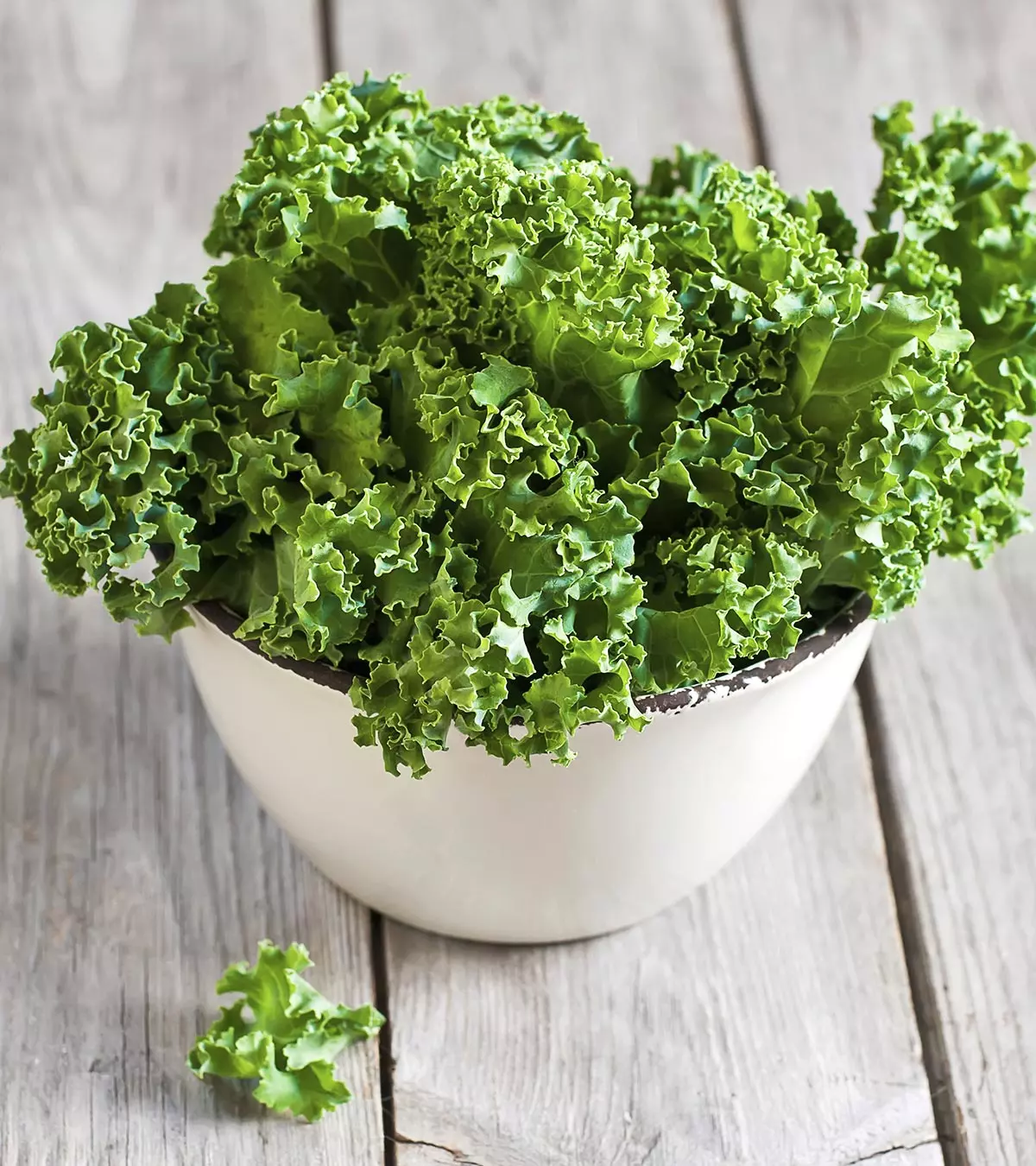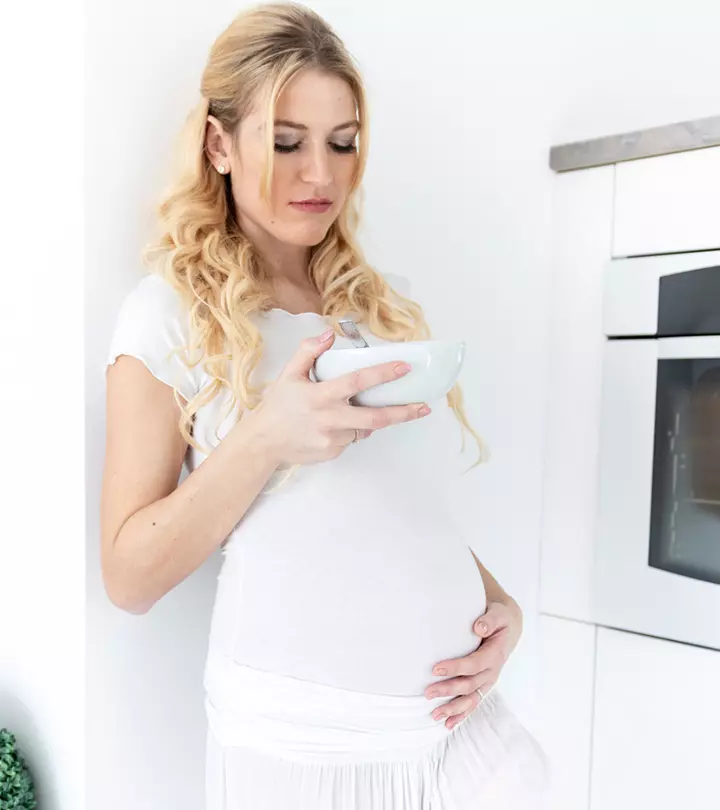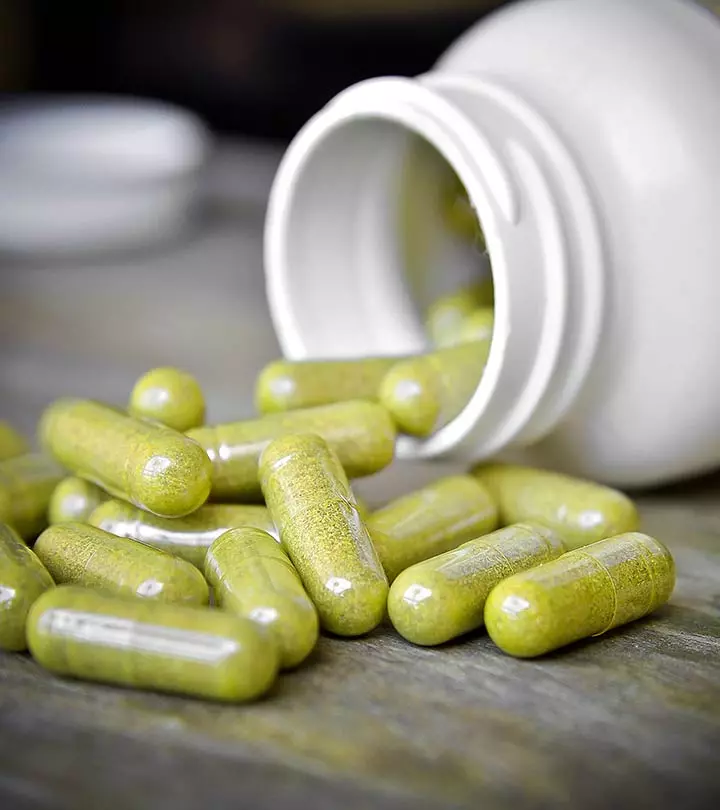
Image: iStock
Essential oils are liquids extracted from different plant parts by various methods (1). The use of essential oils for pregnancy and associated symptoms has gained popularity as it is believed to have a soothing effect by topical use. Mothers take utmost care and spend a lot of time and effort researching and finding the essential oils that are safe for them and their babies during pregnancy. We have made it easier by listing pregnancy-safe essential oils, their benefits, and safety. So read on and make an informed decision while choosing an essential oil to aid you in pregnancy.
Key Pointers
- Always dilute the concentrated essential oil to 1% or less before using it.
- Ingestion of essential oil during pregnancy is not considered safe.
- Use only pregnancy-safe and authentic essential oils during pregnancy.
- Seek medical advice before using any essential oil during pregnancy.
Is It Safe to Use Essential Oils When Pregnant?
According to the pregnancy guidelines by the International Federation of Professional Aromatherapists (IFPA), essential oils can cross the placental barrier and affect the fetus if proper dilutions are not used
(2). Therefore, using essential oils judiciously during pregnancy is of utmost importance. However, scientific evidence regarding its safety is limited, as conducting studies on pregnant women is unsafe and unethical. Therefore, take expert opinions from your healthcare provider or a qualified aromatherapist before using essential oils in your pregnancy.
How Do Essential Oils Work During Pregnancy?

Essential oils, as a part of complementary therapy, are mainly used in two ways:
- Aromatherapy
Aromatherapy involves the inhalation of essential oil. It can be achieved through diffusing, spritzing, direct sniffing, or steam inhalation (3). Once inhaled, they stimulate the brain and elicit various positive responses, such as mood enhancement (4).
- Topical application
It can be achieved by mixing EOs with creams, toners, lotions, or massage oils. Essential oils in their pure form can be applied to the skin after dilution or added to warm bath water (3). Either way, they get absorbed into the superficial skin layers (5) and help in proper skin care.
 Quick tip
Quick tipEssential Oils And Their Benefits During Pregnancy
Using safe essential oils to alleviate pregnancy-related symptoms may be a natural approach.
Find some of the best essential oils and the benefits they might confer for optimum prenatal care.
1. Lavandula angustifolia (lavender) oil
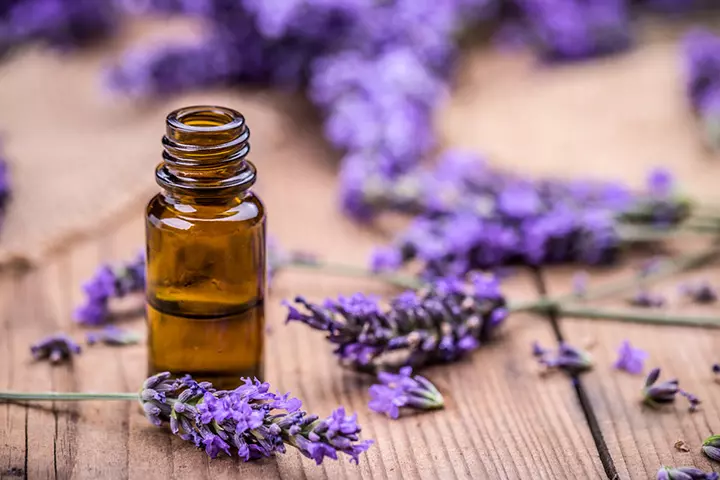
- Reduces stress, anxiety, depression, and promotes relaxation (7)
- Treats nausea and vomiting (8) (9) (10)
- Eases postpartum depression (PPD) (11)
- Reduces labor pain and duration (12)
- Shows antipruriticiA medicine that helps relieve itching properties when combined with peppermint and turmeric oil (13)
- Can be used for episiotomyiSurgical incision made between vagina and anus to facilitate childbirth wound care (14)
- Improves immunity and has an anti-inflammatory action (15)
2. Mentha piperita (peppermint) oil
- Treats migraine and headaches (16) (17)
- Reduces the severity of pruritus gravidarumiSevere itchiness associated with pregnancy (18)
- Relieves swelling and pain in lower extremities (19)
- Reduces the symptoms associated with emesis gravidarum (20)
- Eases postoperative nausea (21)
- Helps alleviate the symptoms of irritable bowel syndrome (IBS) (22)
- Might reduce the symptoms of functional dyspepsiaiA digestive disorder characterized by an upset stomach with no clear underlying cause and the spasms that occur due to endoscopy (22)
3. Boswellia Carterii (frankincense) oil
- Reduces the intensity of labor and delivery pain(23)
- May act as an anxiolyticiHave the ability to reduce anxiety during labor (24) (25)
4. Pelargonium graveolens (rose geranium) essential oil
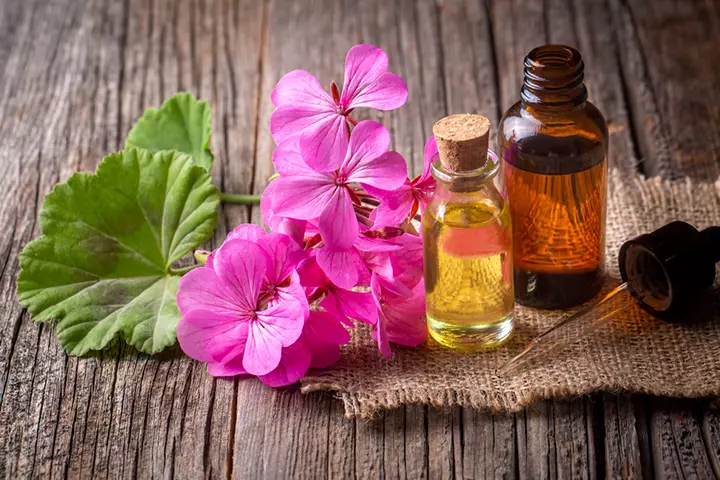
- Reduces anxiety during labor (26)
- Massaging with a blend of geranium, cypress, and lemon added to a lotion may help support varicose veins (27)
5. Rosa damascena (rose) oil
- Reduces the intensity of pregnancy-related low back pain (28)
- Manages the symptoms of postpartum depression (11)
- Eases the severity of labor pain (29)
6. Citrus aurantium var. Amara (neroli) oil
- Relieves anxiety, and labor pain (30)
- Aids in stress relief of hospitalized high-risk pregnant women (31)
7. Zingiber officinale (ginger) oil
- Reduces the severity of emesis gravidarumiA condition characterized by severe nausea and vomiting during pregnancy when combined with lemon or mint (32) (33)
8. Citrus limonum (lemon) oil
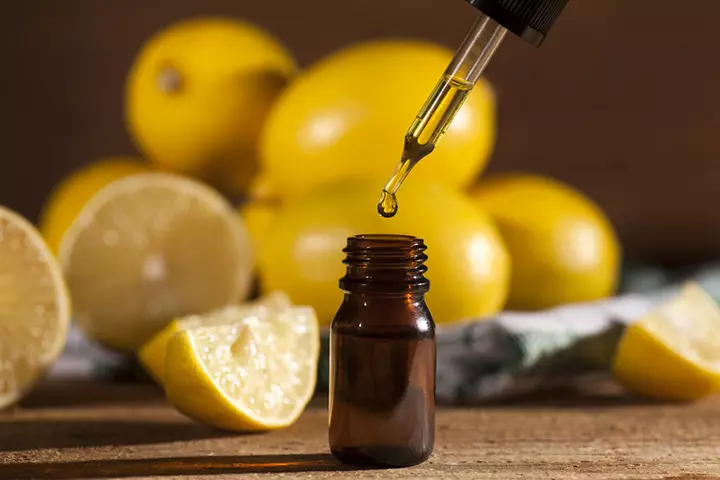
- Reduces the severity of nausea and vomiting (34)
 Caution
CautionEssential Oils To Avoid During Pregnancy
Various natural remedies in alternative medicine utilize essential oil to treat, cure, or manage different health conditions. However, some essential oils are not considered safe during pregnancy as they may cause adverse effects such as pregnancy loss, reproductive hormone modulation, maternal toxicity, teratogenicityiThe ability to cause defects in the developing fetus , and embryo-fetotoxicityiInterference in the normal growth, development and differentiation of the embryo or fetus due to alterations caused by chemical agents (36). This is an elaborate but non-exhaustive list of some essential oils and their possible side effects during pregnancy.
| Essential OIl | Hazard |
|---|---|
| Anise and aniseed myrtle | Reproductive hormone modulation |
| Araucaria | Fetotoxic, Anti-angiogenic |
| Basil oil (estragole chemotype) | Potentially carcinogenic |
| Bitter fennel | Reproductive hormone modulation |
| Black seed (black cumin or black caraway) | Fetotoxic |
| Blue cypress (Northern cypress pine) | Fetotoxic, Anti-angiogenic |
| Buchu (diosphenol chemotype) | Abortifacient; Hepatotoxicity |
| Cassia (Chinese or false cinnamon) | Embryotoxicity, Reproductive toxicity |
| Cinnamon bark | Embryotoxicity |
| Costus | Fetotoxicity, Anti-angiogenesis |
| Dalmatian sage | Embryotoxic |
| Green yarrow (Ligurian yarrow) | AbortifacientiThe ability to cause an abortion |
| Indian dill seed (Sowa) | HepatotoxiciAn ability to cause severe damage to the liver , NephrotoxiciAn ability to cause damage to the kidneys , Abortifacient |
| Lemon basil | Teratogenicity |
| Lemon myrtle (Lemon ironwood or sweet Verbena tree) | Teratogenicity |
| Lemongrass | Teratogenicity |
| Myrrh (Somalian myrrh) | Fetal Toxicity and anti-angiogenic |
| Oregano | Embryotoxic |
| Parsley leaf and seed | Abortifacient |
| Rue | Abortifacient |
| Savin | Embryo-fetotoxic, abortifacient and hepatotoxic |
| Spanish sage (Lavender sage) | Abortifacient |
| Star anise | Reproductive hormone modulation |
| Sweet fennel | Reproductive hormone modulation |
| Wintergreen | Teratogenic at high doses |
| Wormwood (Absinthe) | Embryo-fetotoxicity, abortifacient |
| Zedoary (white turmeric, hidden ginger) | Antifertility, embryotoxicity, anti gestational and abortifacient |
When Should You Avoid Essential Oils?
Essential oil use during the first trimester and in high-risk pregnancies are not encouraged by aromatherapists, herbal medicine experts, and medical professionals as their usage might affect the developing fetus. Therefore, essential oil usage in the first trimester should be done only under the guidance and supervision of a medical practitioner.
Precautions To Be Taken When Using Essential Oils
Incorrect usage of essential oils may cause harm in susceptible populations. Follow these precautions to ensure safety while using essential oils during pregnancy.
- Dilute the essential oil to 1% or less using a carrier oil (2)
- Do not add more than four drops of the essential oil when using it in a bath (2)
- Ingestion of essential oil is generally not recommended (3)
- Check the purity of the essential oil before purchasing. Use pure and authentic therapeutic essential oils (2)
- Test for allergies using a skin test
- Avoid prolonged use of essential oils (37)
- Keep oils away from the flame as they are highly flammable (37)
- Follow the instructions on the product label or leaflet
- Use the appropriate method of application (38)
Myths About Using Essential Oils During Pregnancy
Many claims regarding the use and safety of essential oils are seldom backed by scientific evidence. Let’s look at some myths and facts associated with essential oils.
| Myths | Facts |
|---|---|
| Essential oils affect the fetus | The usage of safe essential oils in prescribed amounts does not pose a threat. Some constituents in oils can cause adverse effects only when used in higher doses (39) |
| Essential oil affects the mother | Not all essential oils are harmful during pregnancy. Using pregnancy-safe oils listed in the guidelines by IFPA may offer various health benefits (2) |
| Frankincense oil can cause miscarriages | There are no scientific studies that prove this claim. A study that used frankincense aromatherapy along with some dietary modifications in Iranian pregnant women showed positive results (40) |
| Peppermint oil use could cause premature birth and also decreases milk supply | The FDA generally considers peppermint safe and can be used as a food additive (41). Not much is known about the safety of peppermint oil during pregnancy (42) |
How To Find Quality Essential Oils
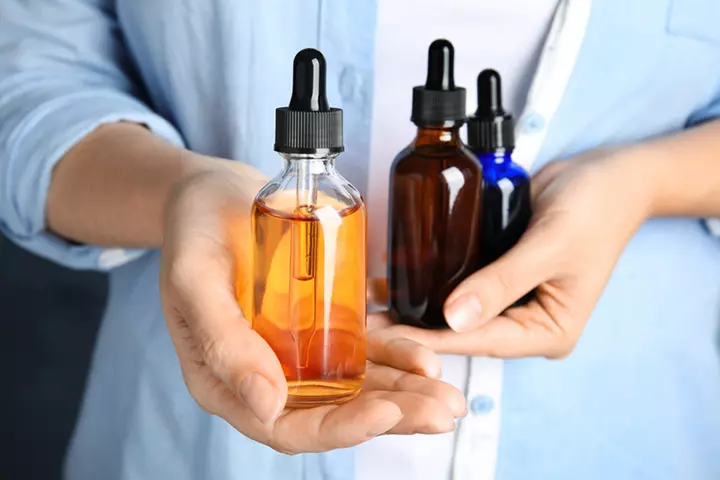
As essential oil comes from different parts of the world, its quality can vary. Therefore, some important considerations before choosing an essential oil are below (43) (44).
- Research the essential oil that you intend to use
- Research and buy from a trusted brand or supplier
- Avoid oils labeled “fragrance oil,” as they are synthetic
- Look for oils that are therapeutic grade
- Ensure the oil of your interest is appropriately labeled and packaged
- Buy oils stored in dark-colored containers
- Some oils, including sandalwood and rose, are quite expensive. If you are getting them for cheap in a deal, it is a sign that it is not of good quality.
Frequently Asked Questions
1. Is smelling essential oils safe for pregnancy?
Yes, inhalation of diluted essential oils is considered to be the safest route (3).
2. Is it safe to diffuse essential oils when pregnant?
Since aromatherapy is considered safer than topical application, diffusing essential oils with the help of a diffuser may be the safest alternative. However, it is essential to understand that moderation is the key because prolonged exposure can cause nausea, lethargy, headaches, and vertigo (37).
3. What essential oils can I use in the first trimester?
Pregnant women are generally advised against using essential oils without the doctor’s consent. If directed by your physician, some essential oils can be used to treat the symptoms of nausea and vomiting during the first trimester (20).
Essential oils are plant-derived oils that offer several health benefits to pregnant women when used in recommended dosages. The chemical constituents of each essential oil help women determine the safe essential oils for pregnancy. Therefore, it’s necessary to know how to differentiate between useful and harmful essential oils to avoid adverse outcomes for yourself and the fetus. Choosing a high-quality essential oil can help reap maximum benefits while ensuring utmost safety. Rather than resorting to self-care using essential oils, always take guidance from your Ob/Gyn before incorporating them into your pregnancy routine to promote holistic health and wellness.
Infographic: Using Essential Oils In Pregnancy
A wide variety of essential oils are available in the market. However, you should be using these oils with the utmost care during pregnancy, irrespective of the origin and type. Let’s look at the various application methods of pregnancy-safe essential oils in the infographic below. Illustration: Momjunction Design Team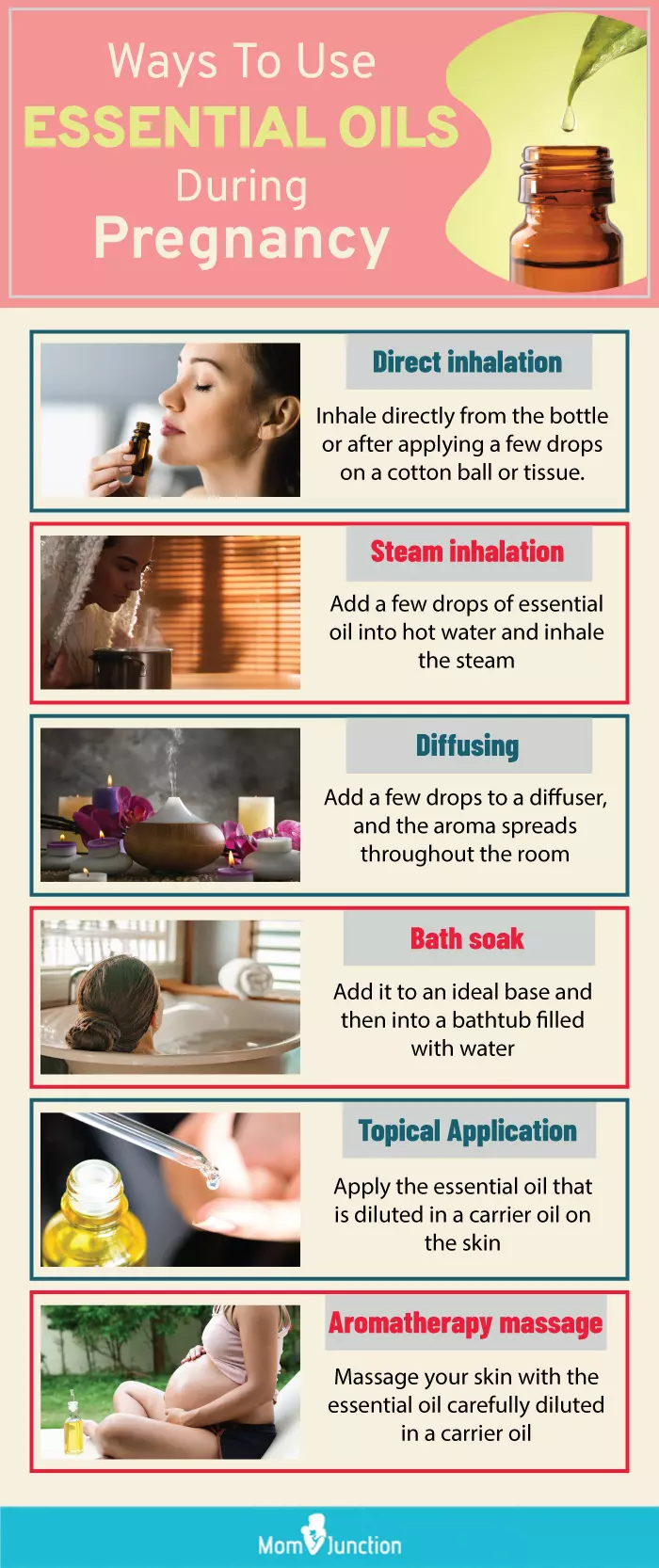
Illustration: Essential Oils For Pregnancy: What Are Safe And What To Avoid
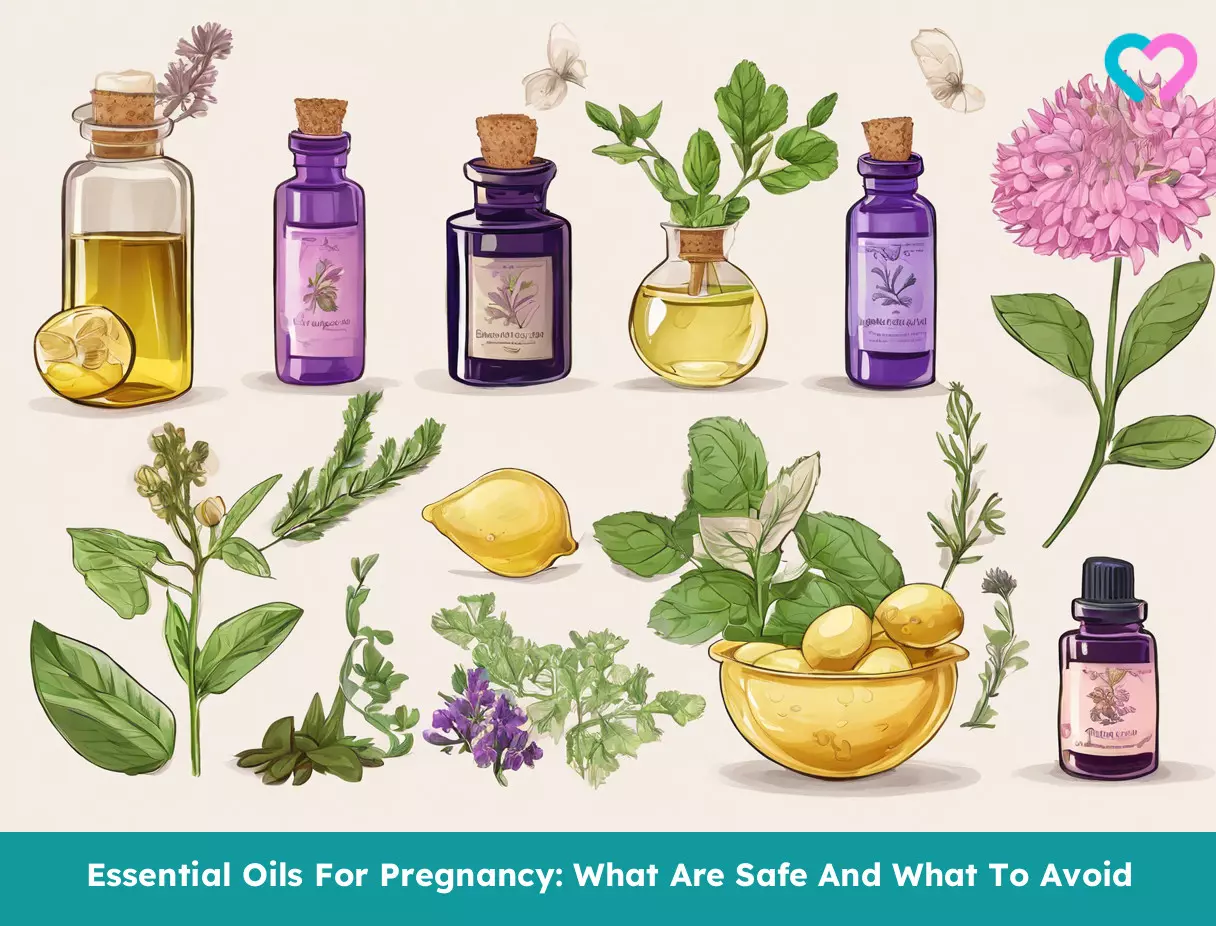
Image: Stable Diffusion/MomJunction Design Team
Do you use essential oils on a regular basis, but doubt if they are safe for pregnancy? Watch this video to learn more.
References
- Babar Ali et al.; (2015); Essential oils used in aromatherapy: A systemic review.
https://www.sciencedirect.com/science/article/pii/S2221169115001033?via%3Dihub - Pregnancy Guidelines; IFPA.
https://naha.org/assets/uploads/PregnancyGuidelines-Oct11.pdf - Review: Essential Oil Use During Pregnancy.
https://integrativerd.org/difm/resources/article-archives/essential-oils-during-pregnancy - Deborah V Thomas ; (2002); Aromatherapy Mythical, Magical, or Medicinal?
https://journals.lww.com/hnpjournal/Abstract/2002/10000/Aromatherapy__Mythical,_Magical,_or_Medicinal_.5.aspx - Sérgio Faloni de Andrade et al.; (2021); Characterizing the Mechanism of Action of Essential Oils on Skin Homeostasis—Data from Sonographic Imaging, Epidermal Water Dynamics, and Skin Biomechanics.
https://www.mdpi.com/2079-9284/8/2/36 - Bath Safety.
https://tisserandinstitute.org/safety/bath-safety/ - Fatemeh Effati-Daryani et al.; (2015); Effect of Lavender Cream with or without Foot-bath on Anxiety, Stress and Depression in Pregnancy: a Randomized Placebo-Controlled Trial.
https://www.ncbi.nlm.nih.gov/pmc/articles/PMC4363653/ - Azam Amzajerdi et al; (2021); Effect of Lavender Oil on Nausea, Vomiting, and Anxiety in Pregnant Women: A Randomized Clinical Trial.
https://assets-eu.researchsquare.com/files/rs-681694/v1/a2067f44-f2f6-4318-969a-1ca5cfe107ab.pdf?c=1631886072 - Jia Li et al.; (2022); Study of the Mechanism of Antiemetic Effect of Lavandula angustifolia Mill. Essential Oil Based on Ca2+/CaMKII/ERK1/2 Pathway.
https://www.ncbi.nlm.nih.gov/pmc/articles/PMC9341382/ - Maryam Alikamali et al.; (2023); The effects of Citrus aurantium and lavender aromas on nausea and vomiting of pregnancy in nulliparous pregnant women: A randomized clinical trial.
https://www.nmsjournal.com/article.asp?issn=2322-1488;year=2022;volume=11;issue=4;spage=229;epage=233;aulast=Alikamali - Maryam Kianpour et al.; (2018); The Effects of Inhalation Aromatherapy with Rose and Lavender at Week 38 and Postpartum Period on Postpartum Depression in High-risk Women Referred to Selected Health Centers of Yazd, Iran in 2015.
https://www.ncbi.nlm.nih.gov/pmc/articles/PMC6111664/ - Sahar Mansour Lamadah et al.; (2016); The Effect of Aromatherapy Massage Using Lavender Oil on the Level of Pain and Anxiety During Labour Among Primigravida Women.
https://www.researchgate.net/profile/Sahar-Lamadah/publication/304339251_The_Effect_of_Aromatherapy_Massage_Using_Lavender_Oil_on_the_Level_of_Pain_and_Anxiety_During_Labour_Among_Primigravida_Women/links/580e5ee308ae47535247b450/The-Effect-of-Aromatherapy-Massage-Using-Lavender-Oil-on-the-Level-of-Pain-and-Anxiety-During-Labour-Among-Primigravida-Women.pdf?_sg%5B0%5D=started_experiment_milestone&origin=journalDetail - Farid Husin.; (2021); A randomized controlled trial of combination of peppermint, lavender, and turmeric oil for antipruritic agent in pregnant women.
http://mji.ui.ac.id/journal/index.php/mji/article/view/4467 - KatayonVakilian et al.; (2011); Healing advantages of lavender essential oil during episiotomy recovery: A clinical trial.
https://www.sciencedirect.com/science/article/abs/pii/S1744388110000381 - D. Giovannini et al.; (2016); Lavandula angustifolia Mill. Essential Oil Exerts Antibacterial and Anti-Inflammatory Effect in Macrophage Mediated Immune Response to Staphylococcus aureus.
https://www.tandfonline.com/doi/abs/10.3109/08820139.2015.1085392 - Mahmood Rafieian-kopaei et al.; (2019); Comparing the Effect of Intranasal Lidocaine 4% with Peppermint Essential Oil Drop 1.5% on Migraine Attacks: A Double-Blind Clinical Trial.
https://www.ncbi.nlm.nih.gov/pmc/articles/PMC6647908/ - H Göbel et al.; (1994); Effect of peppermint and eucalyptus oil preparations on neurophysiological and experimental algesimetric headache parameters.
https://onlinelibrary.wiley.com/doi/abs/10.1046/j.1468-2982.1994.014003228.x - Marjan Akhavan Amjadi et al.;(2012); The Effect of Peppermint Oil on Symptomatic Treatment of Pruritus in Pregnant Women.
https://www.ncbi.nlm.nih.gov/pmc/articles/PMC3813175/ - Ari Han et al.;(2022);Effects of Foot Bath and Spray Application of Peppermint and Grapefruit Essential Oils on Lower Extremity Edema, Pain, and Fatigue.
https://koreascience.kr/article/JAKO202207750124261.page - I Gusti Ayu Ratih Agustini et al.;(2022); The Effect of Peppermint Aromatherapy on The Incidence of Emesis Gravidarum in The First and Second Trimester Pregnant Women in The Working Area of South Denpasar Public Health Center I, Denpasar City.
https://aisyah.journalpress.id/index.php/jika/article/view/7217 - Sylvina Tate; (2008);Peppermint oil: a treatment for postoperative nausea.
https://onlinelibrary.wiley.com/doi/abs/10.1046/j.1365-2648.1997.t01-15-00999.x - Rouzbeh Shams et al.; (2015); Peppermint Oil: Clinical Uses in the Treatment of Gastrointestinal Diseases.
https://www.jscimedcentral.com/public/assets/articles/article-pdf-1635591320-7332.pdf - Sara Esmaelzadeh-Saeieh et al.;(2018); The effects of inhalation aromatherapy with Boswellia carterii essential oil on the intensity of labor pain among nulliparous women.
http://journals.lww.com/nams/pages/default.aspx - Mi Kyoung Lee etal.; (2011); Effects of the Spouse’s Aromatherapy Massage on Labor Pain, Anxiety and Childbirth Satisfaction for Laboring Women.
https://synapse.koreamed.org/articles/1037275 - Ashraf Ghiasi et al.; (2019); A Systematic Review on the Anxiolytic Effect of Aromatherapy during the First Stage of Labor.
https://www.ncbi.nlm.nih.gov/pmc/articles/PMC6428160/ - Geranium Aromatherapy for Anxiety During Childbirth.
https://www.naturalhealthresearch.org/geranium-aromatherapy-for-anxiety-during-childbirth/ - Aromatherapy During Pregnancy.
https://healthyfocus.org/9-proven-essential-oils-for-varicose-veins/ - Mahbobeh Shirazi et al.; (2016); The Effect of Topical Rosa damascena (Rose) Oil on Pregnancy-Related Low Back Pain: A Randomized Controlled Clinical Trial.
https://journals.sagepub.com/doi/full/10.1177/2156587216654601 - Aliye Chughtai et al.; (2018); Comparing the Effect of Aromatherapy With Essential Oils of Rosa damascena and Lavender Alone and in Combination on Severity of Pain in the First Phase of Labor in Primiparous Women.
https://www.cjmb.org/uploads/pdf/pdf_CJMB_211.pdf - Cristiano Scandurra et al.; (2022); The Effectiveness of Neroli Essential Oil in Relieving Anxiety and Perceived Pain in Women during Labor: A Randomized Controlled Trial.
https://www.mdpi.com/2227-9032/10/2/366 - Gee Youn Go et al.; (2017); Effects of Aroma Inhalation Therapy on Stress, Anxiety, Depression, and the Autonomic Nervous System in High-risk Pregnant Women.
https://synapse.koreamed.org/articles/1106338 - Retno Palupi Yonni Siwi et al.; (2022); The Effectiveness of Ginger Oil Aromatherapy and Lemon Oil Aromatherapy on Reducing Emesis Gravidarum in Pregnant Women.
https://midwifery.iocspublisher.org/index.php/midwifery/article/view/992 - Indah Putri Ramadhanti et al.; (2021); Ginger (Zingiber Officinale) and Mint Leaves (Mentha Piperrita L) Alleviate Emesis Gravidarum.
http://wmmjournal.org/index.php/wmm/article/view/21 - Ezzati Arasteh et al.; (2019); The Effect of Lemon aromatherapy on nausea and vomiting of pregnancy: A randomized clinical trial.
https://www.ncbi.nlm.nih.gov/pmc/articles/PMC4005434/ - Noura S. Dosoky et al.; (2018); Biological Activities and Safety of Citrus spp. Essential Oils.
https://www.ncbi.nlm.nih.gov/pmc/articles/PMC6073409/ - Noura S. Dosoky et al.; (2021); Maternal Reproductive Toxicity of Some Essential Oils and Their Constituents.
https://www.ncbi.nlm.nih.gov/pmc/articles/PMC7956842/ - Safety Information.
https://naha.org/explore-aromatherapy/safety - Are Essential Oils Safe?.
https://www.takingcharge.csh.umn.edu/are-essential-oils-safe - Toxicity Myths: the Actual Risks of Essential Oil Use.
https://img.perfumerflavorist.com/files/base/allured/all/document/2016/02/pf.0013.pdf - Talat Khadivzadeh et al.; (2012); Complementary and alternative medicine use in pregnancy in Mashhad, Iran, 2007-8.
https://pubmed.ncbi.nlm.nih.gov/23833624/ - CFR – Code of Federal Regulations Title 21.
https://www.accessdata.fda.gov/scripts/cdrh/cfdocs/cfcfr/CFRSearch.cfm?fr=182.20&SearchTerm=peppermint - Peppermint Oil
https://www.nccih.nih.gov/health/peppermint-oil - Purchasing Fixed Oils and Essential Oils for Therapeutic Uses Guidelines
https://ifaroma.org/application/files/1515/6441/3218/PURCHASE_OF_FIXED_OILS_AND_ESSENTIAL_OILS_FOR_THERAPEUTIC_USES_GUIDELINES.pdf - Aromatherapy: Do Essential Oils Really Work?
https://www.hopkinsmedicine.org/health/wellness-and-prevention/aromatherapy-do-essential-oils-really-work
Community Experiences
Join the conversation and become a part of our nurturing community! Share your stories, experiences, and insights to connect with fellow parents.
Read full bio of Dr. Swati Chitnis
Read full bio of Shinta Liz Sunny
Read full bio of Dr. Ritika Shah
Read full bio of Lorraine Teron






